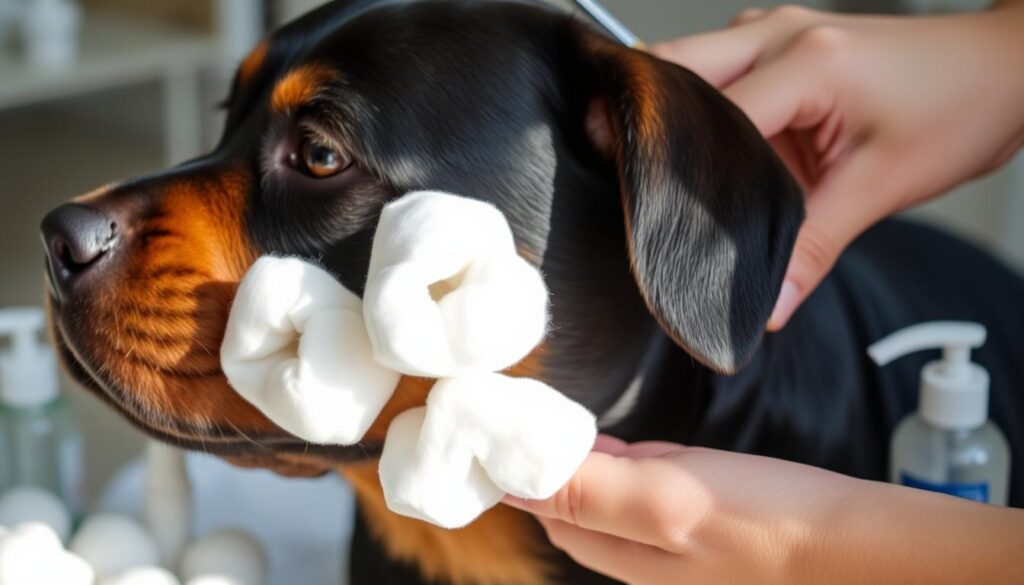Cropped Ears Rottweiler: What You Need to Know

Did you know ear cropping is common in many breeds, including Rottweilers? But it’s never been part of their breed standard. Many dog lovers don’t know that ear cropping was meant for working dogs. Now, it’s a big debate1.
It’s important to understand ear cropping for anyone thinking about it for Rottweilers. There are big ethical and health issues to consider. This section will guide you through the history, breed standards, and debates about ear cropping. It’s also key to know the American Veterinary Medical Association wants to stop ear cropping in breed standards1.
They say dogs with natural ears can do just as well in competitions. So, whether you’re thinking of getting a Rottweiler or are a breeder, knowing about ear shape and care is crucial.
Key Takeaways
- Ear cropping was never part of Rottweiler breed standards.
- Ear cropping is commonly associated with working or guard dogs.
- Health risks include infections and pain associated with the procedure.
- Popular sentiment is shifting against ear cropping in American dog culture.
- States regulate ear cropping differently, with some banning it outright.
- Cropped or natural ears do not affect show potential in Rottweilers.
Understanding the Rottweiler Breed Standards
The Rottweiler breed has clear breed standard guidelines from groups like the United Kennel Club (UKC). They were recognized in 1950. Rottweilers are known for their strong build, which comes from their history of herding and guarding cattle. Adult males are 24 to 27 inches tall, and females are 22 to 25 inches2.
They have a unique look, with a medium-length, coarse, and flat topcoat3.
Keeping certain traits is key for the Rottweiler’s identity. Faults include straw-colored markings, while disqualifications are albinism and any color other than black and tan2. They should have complete dentition, a scissor bite, and dark brown eyes3.
Knowing these rottweiler breed standards helps us see what makes them special. It also shows the value of proper care and breeding. Plus, services like Pet Health Matching Account Services can help manage healthcare costs for your Rottweiler.
History of Rottweiler Ears and Crop Practices
The history of Rottweiler ears is closely tied to the breed’s origins. Rottweilers were once used for herding, and their floppy ears helped them communicate. Unlike some breeds, Rottweilers’ ear shape was practical, not just for looks.
Many working breeds had their tails and ears cut for looks, but Rottweilers were spared. The canine ear crop history shows a debate on ear cropping’s need. People now see the original purpose of Rottweilers and resist ear cropping.
Even kennel clubs once supported cropped ears, but opinions have changed. Countries like Australia, Germany, and the UK now ban or limit ear cropping. This shift supports the idea that dogs should be treated with care, not just for looks.
Why Cropped Ears Rottweiler? Insights into the Practice
The debate over ear cropping in dogs is ongoing. Looking into the historical context of ear cropping helps us understand why some breeds, like Rottweilers, have cropped ears. Others do not.
Historical Context of Ear Cropping
Ear cropping started as a way to improve the looks and fighting skills of certain dogs. It was believed to prevent injuries and make them look scarier. But, Rottweilers were not bred for fighting, making ear cropping unnecessary for them. Today, the American Kennel Club (AKC) lists 20 breeds with cropped ears, showing how different breeds have different ear standards4.
Reasons Behind Ear Cropping in Other Breeds
There are several reasons why some dogs have their ears cropped. People might do it for looks or to prevent injuries. But, it can also lead to problems like trouble communicating and aggression. This can make it harder for shelter pets to find homes.
Every year, about 130,000 puppies in the U.S. have their ears cropped. This raises concerns about their pain and long-term mental health. There are also risks like infections and discomfort, which can affect their behavior5.
Rottweiler Ear Cropping: Common Myths vs. Facts

When we talk about Rottweiler ear cropping, it’s key to know the myths. Many think cropped ears help dogs hear better or prevent ear infections. Learning the truth about myths about ear cropping helps you care for your Rottweiler better.
Myth: Improved Hearing Capabilities
Some believe cropped ears make dogs hear better. But, there’s no science backing this up. Vets say a dog’s ear type doesn’t really affect their hearing.
Myth: Reducing Ear Infections
Many think ear cropping stops ear infections. But, studies show ear infections depend on genes and environment, not ear look. Most vets say cropping doesn’t lower ear infection risk, as infections can happen to any dog.
Knowing these myths is crucial when thinking about ear surgeries for your Rottweiler. It’s vital to put their health first, not just looks. Focus on good care instead.
Rottweiler Ear Shape: Natural vs. Cropped
The rottweiler ear shape changes a lot between natural and cropped ears. Natural ears are floppy and help with communication and awareness. On the other hand, cropped ears Rottweiler are liked for their looks, sparking debates about their impact.
Knowing about these ear types is key for those thinking of getting a Rottweiler. Natural ears make them look friendly and perfect for family pets. But, cropped ears can look scary, which some owners like for their guard dog look.
It’s vital to consider both sides. Some say ear cropping helps with ear health and reduces infections. Yet, it’s painful for the dog and raises ethical questions6.
| Aspect | Natural Ears | Cropped Ears |
|---|---|---|
| Appearance | Floppy and friendly | Sharp and intimidating |
| Functionality | Effective communication | Potential misunderstandings |
| Health Concerns | Lower risk of infections | Post-operative pain and complications |
| International Regulations | Accepted worldwide | Illegal in many countries7 |
| Owner Preferences | Majority favor natural look | Some prefer traditional aesthetics6 |
Choosing the right ear shape for your Rottweiler is important. It affects their well-being and how they interact with others. Making an informed choice is crucial.
Rottweiler Ear Care and Maintenance

It’s important to take care of your Rottweiler’s ears, whether they’re natural or cropped. Good ear hygiene helps prevent infections and keeps your dog healthy and happy. This guide will help you with natural ear care and post-operative care for cropped ears.
Proper Care for Natural Ears
Keeping your Rottweiler’s ears healthy is key. Regular checks can spot ear infections or irritations early. Here are some tips for caring for your Rottweiler’s ears:
- Use vet-approved solutions to clean the ears and remove wax and debris.
- Look for signs of infections like redness or a bad smell in the ears.
- Watch your dog’s diet to avoid obesity, as it can lead to ear problems.
- Be careful of allergens like dust and pollen that can harm ear health.
Post-Operative Care after Ear Cropping
After ear cropping, your Rottweiler needs special care. Following these steps is crucial for recovery:
- Keep the ears clean and dry to prevent infections. Your vet may give you ointments for this.
- Use a protective collar to stop your dog from scratching or shaking its head too much.
- Watch for signs of discomfort like whining or shaking its head a lot.
- Go to follow-up vet appointments to check on healing and solve any problems quickly.
Good ear care is essential for your Rottweiler’s health. By paying attention to both natural ear care and post-operative care, you can help your dog live a happy and healthy life.
| Ear Type | Care Guidelines |
|---|---|
| Natural Ears |
|
| Cropped Ears |
|
Rottweilers can face health issues like ear problems. Proper care can reduce the risk of infections. With careful attention, you can keep your Rottweiler healthy for its whole life89.
Best Ear Cropping for Rottweilers: What to Consider
Deciding to crop a Rottweiler’s ears is a big decision. You need to think about the considerations for ear surgery and what you want the outcome to be. This might include different rottweiler ear cropping styles.
Many owners find cropped ears very appealing. Brad Gargis shared a story about a Rottweiler with cropped ears and how much he admired it. This shows how personal taste affects the decision10. However, some dog lovers question if cropped ears fit the breed standards10. It’s important to know the difference between looks and breed integrity when thinking about ear cropping.
Then, talk to a vet who knows about best practices for ear cropping. Remember, ear cropping is seen as a cosmetic choice, and it comes with risks, as the AVMA points out11. Many breeds, including Rottweilers, get this surgery when they’re young, between 8-12 weeks old11. Knowing the different ear crop styles can help you make a better choice.
If you decide to go ahead, get ready for your Rottweiler’s recovery. It can be tough for your pet. Talk to your vet about what to expect. This will help both you and your dog adjust better.
Rottweiler Ear Cropping Procedure: Steps Involved
Understanding the rottweiler ear cropping procedure is key for pet owners. It’s a cosmetic surgery with several ear cropping steps. These steps are crucial for your dog’s safety and well-being.
Preparation for Ear Cropping Surgery
Preparation is vital before surgery. Your vet will check if the puppy is healthy enough for the procedure. Anesthesia is used because ear cropping is painful and needs the puppy to stay still.
Ear cropping is usually done on puppies between six to 12 weeks. This is when their ears need to adjust to stand upright12. Make sure to ask about any pre-operative guidelines, like fasting before surgery.
Post-Surgery Recovery and Care
After surgery, post-surgery rottweiler care is crucial. Watch the incisions for signs of infection, like swelling or discharge. Keeping the ears clean and dry helps with healing.
Avoid letting your dog scratch their ears. An Elizabethan collar might be needed to stop this. Follow your vet’s instructions closely for the best care for your dog for more insights on ear cropping. Regular vet visits are important for a smooth recovery and to avoid complications.
| Step | Description |
|---|---|
| Initial Assessment | Consult with a veterinarian to evaluate the puppy’s health. |
| Anesthesia | Administer anesthesia before the surgery for pain relief. |
| Ear Cropping Surgery | Perform the required ear cropping procedure while monitoring vitals. |
| Post-Operative Monitoring | Keep an eye on recovery; check for infection signs. |
| Follow-Up Visits | Ensure regular check-ups with your veterinarian to monitor healing. |
Following these steps is important for a good outcome and recovery. As a pet owner, it’s your duty to be informed and prepared for the procedure.
Rottweiler Ear Cropping Cost: Financial Considerations
Knowing the rottweiler ear cropping cost is key for pet owners. The surgery itself has direct costs. But, there are also expenses related to ear surgery after the operation. These include follow-up visits, medications, and recovery supplies.
The cost of ear cropping varies. It depends on the vet’s expertise, location, and the dog’s age. Many clinics give detailed pricing. This helps understand the financial impact on your Rottweiler’s health.
Initial costs might seem okay, but ongoing care can increase your budget. Be ready for unexpected expenses during recovery. Weigh these costs against the benefits to make an informed choice.
| Expense Type | Estimated Cost Range |
|---|---|
| Surgery Fee | $150 – $600 |
| Post-Operative Medications | $50 – $150 |
| Follow-Up Visits | $30 – $100 per visit |
| Recovery Supplies | $20 – $50 |
Knowing all expenses related to ear surgery helps plan better. It ensures your Rottweiler gets the best care without breaking the bank. Budgeting for these needs supports a smooth recovery.
Deciding on ear cropping involves more than just costs. It affects your Rottweiler’s recovery and health long-term. This shows the need for careful decision-making before surgery.
Consider the growing trend of ear cropping. There’s been a 621% increase in reports12. Also, talking to vets like Dr. Kate Player can provide insights on costs and best practices13.
Rottweiler Ear Cropping Risks: What You Need to Know
Thinking about ear cropping for your Rottweiler? It’s important to know the risks. This isn’t just about looks; it can hurt your dog and lead to health problems later on.
Pain Management and Potential Complications
Ear cropping needs anesthesia, which has its own risks. Sometimes, it’s done without proper care, causing a lot of pain. It’s key to pick a vet you trust for this surgery.
There can be problems like surgical mistakes or not taking good care after surgery. So, think carefully before you decide.
Long-term Health Implications
Ear cropping can also affect your dog’s health for a long time. It can cause permanent ear damage or make your dog unhappy with its looks.
Even though it was once popular, it doesn’t really help your dog’s health. The American Veterinary Medical Association doesn’t support it because of the risks. You should think about the downsides before deciding related to this practice14.
Conclusion
Thinking about cropped ears on Rottweilers? It’s key to consider both sides. Ear cropping is common in some breeds like Dobermans but rare in Rottweilers. It’s not even in the official Rottweiler breed standard15.
The American Kennel Club sees ear cropping as a must for Dobermans. Yet, many breeds stick with their natural ears. This shows a shift towards kinder dog care16.
Some owners might like the look of cropped ears. But, ear cropping doesn’t really help with health, like stopping ear infections15. Also, many vets don’t do it because they care about animal welfare1516.
Being a good dog owner means putting your Rottweiler’s health first. Learning about ear care helps you choose what’s best for your dog’s life.
FAQ
What is Rottweiler ear cropping?
What are the breed standards for Rottweilers regarding ear shape?
Why is ear cropping performed on some dog breeds?
Are there any myths about Rottweiler ear cropping that I should know about?
How should I care for my Rottweiler’s ears?
What should I consider before deciding to crop my Rottweiler’s ears?
What are the costs associated with Rottweiler ear cropping?
What are the risks involved with Rottweiler ear cropping?
Source Links
- https://www.dogster.com/dog-health-care/do-rottweilers-get-ears-cropped – Do Rottweilers Get Their Ears Cropped? Facts & FAQ – Dogster
- https://www.ukcdogs.com/rottweiler – Breed Standards : Rottweiler | United Kennel Club (UKC)
- https://www.thekennelclub.org.uk/breed-standards/working/rottweiler/ – Rottweiler | Breed Standards | The Kennel Club
- https://www.akc.org/expert-advice/news/issue-analysis-dispelling-myths/?rel=sponsored – No title found
- https://spcanevada.org/services/pet-education/animal-ally/tail-docking-and-ear-cropping-what-you-should-know/ – Why Do People Crop Dogs Ears: What You Should Know About Tail Docking and Ear Cropping | SPCA of Northern Nevada
- https://rottweilerlover.com/rottweiler-ears-cropped/ – Rottweiler Ears Cropped – rottweilerlover.com
- https://www.schnauzer-forum.co.uk/viewtopic.php?t=23314 – When is ear cropping animal cruelty?
- https://www.petmd.com/dog/breeds/rottweiler – Rottweiler
- https://www.petethevet.com/lincoln-the-rottweiler-was-suffering-from-a-sore-ear/ – Lincoln the Rottweiler was suffering from a sore ear – Pete the Vet
- https://leerburg.com/webboard/thread.php?topic_id=4782&page=1 – Leerburg Webboard | Ear Clipping Rottweilers
- https://tier1vet.com/bringing-up-two-points/ – Ear Cropping | Why Do People Crop Dogs’ Ears? Things to Consider
- https://www.rspca.org.uk/adviceandwelfare/pets/dogs/health/earcropping – Ear Cropping in Dogs | RSPCA – RSPCA – rspca.org.uk
- https://dpca.org/breed/crop-grants/ – Crop Grants –
- https://www.dogster.com/ask-the-vet/dog-tail-docking-and-ear-cropping – Dog Tail Docking & Ear Cropping: Our Vet Discusses Ethics & Health Considerations – Dogster
- https://www.a-love-of-rottweilers.com/why-rottweilers-dont-have-cropped-ears.html – Why Rottweilers Don’t Have Cropped Ears | A-Love-Of-Rottweilers
- https://www.thedogpress.com/Comments/cropping-docking-effects-ba-15901.asp – EAR CROPPING AND TAIL DOCKING EFFECTS


